Abstract
Diabetes mellitus affects African Americans in disproportionate numbers relative to whites. Proper management of this disease is critical because of the increased morbidity and mortality associated with poor diabetes management. The role of social support in promoting diabetes management and improved glycemic control among African Americans is a little-explored area. This article, the first in a two-part series, provides a theoretical framework for examining the relationship between social support and glycemic control among African-American adults.
Full text
PDF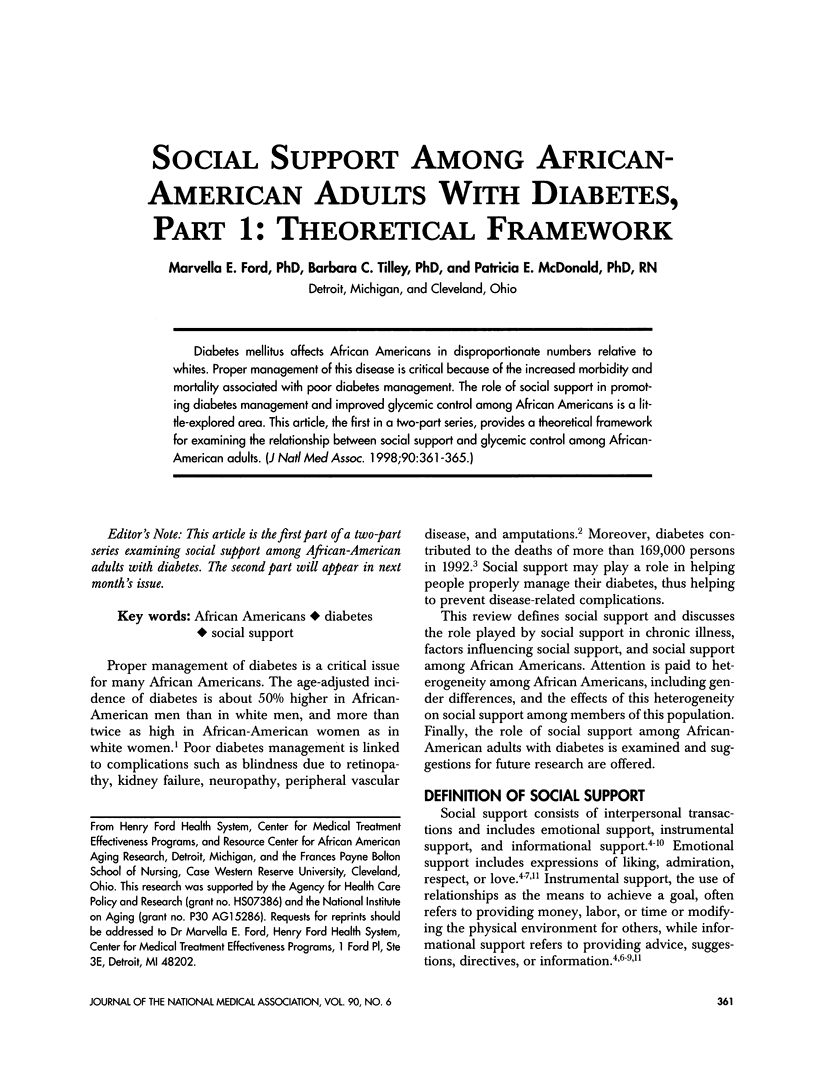
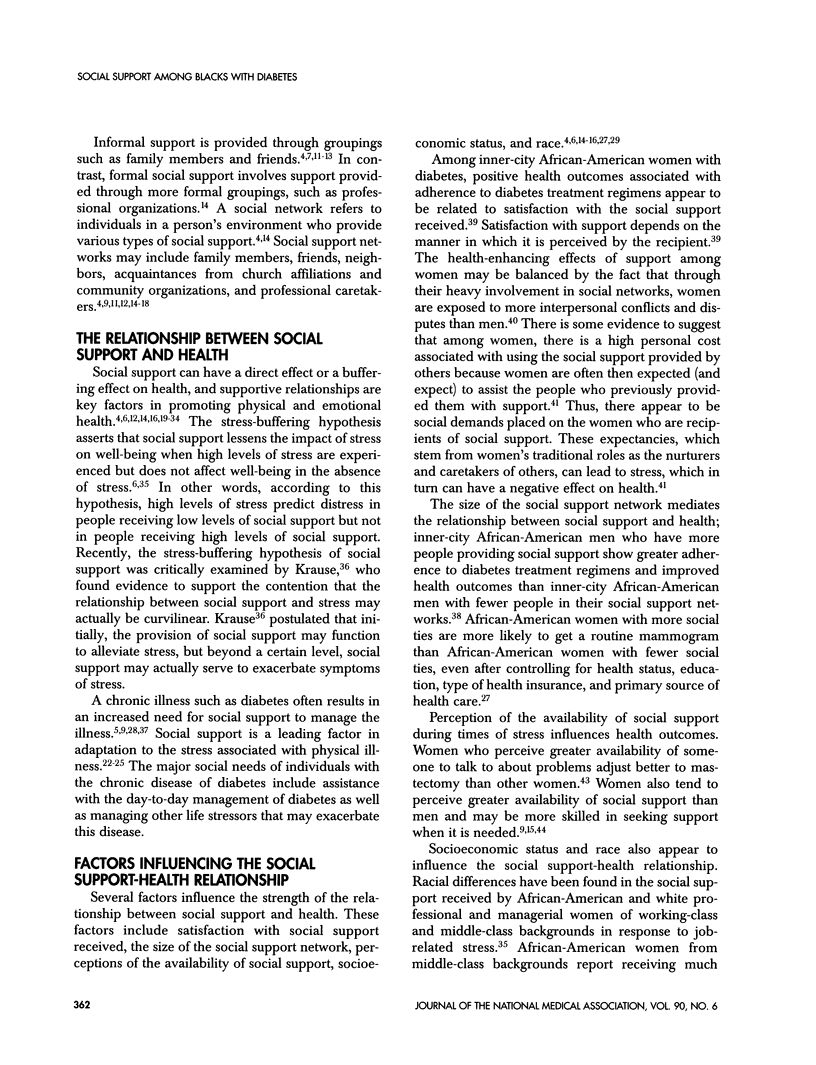
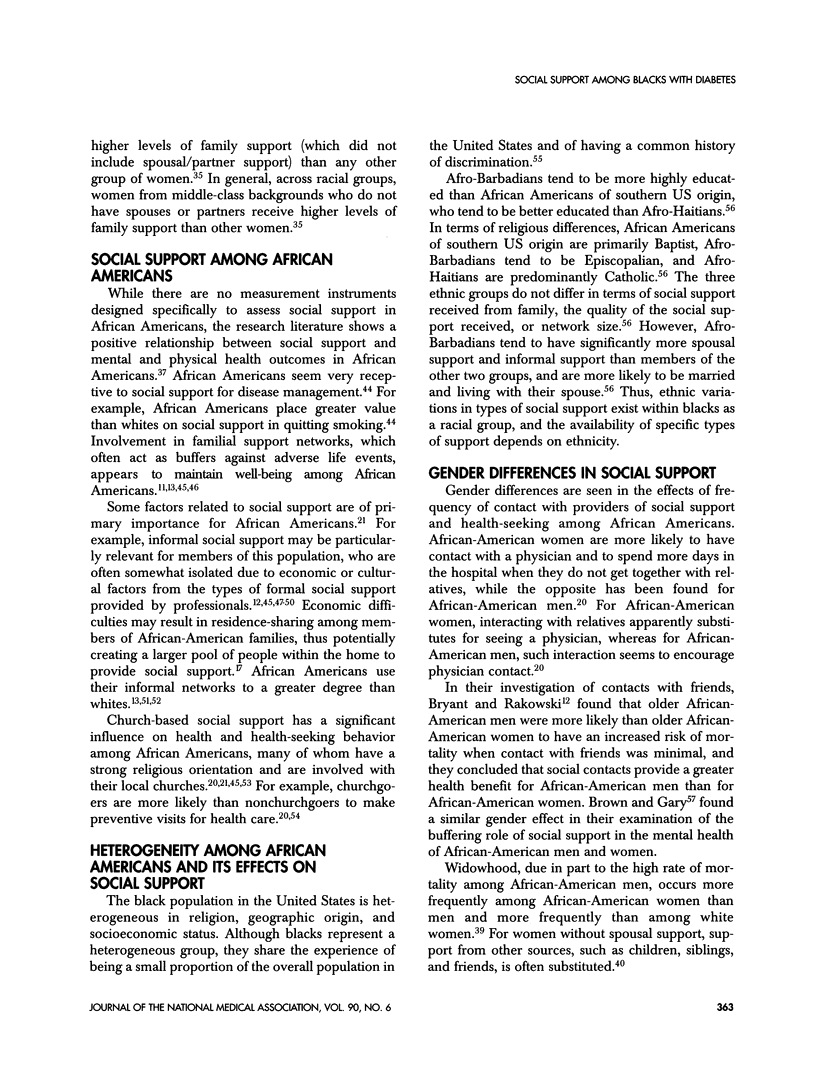
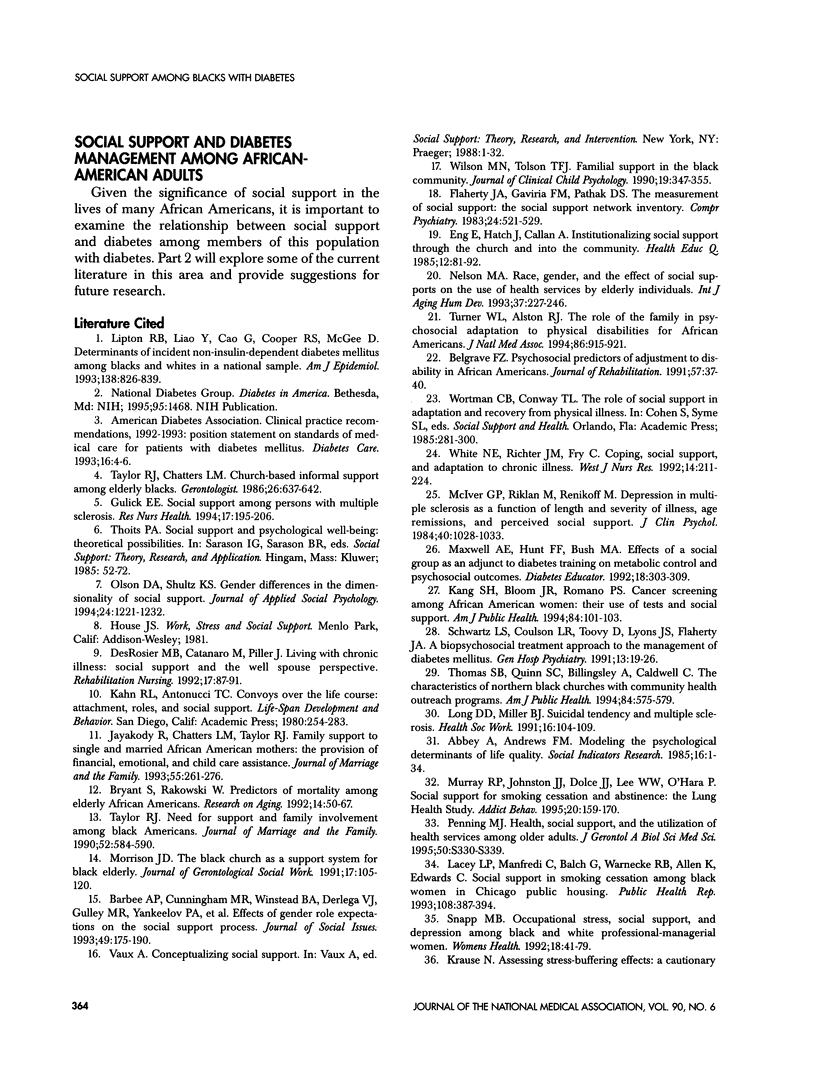
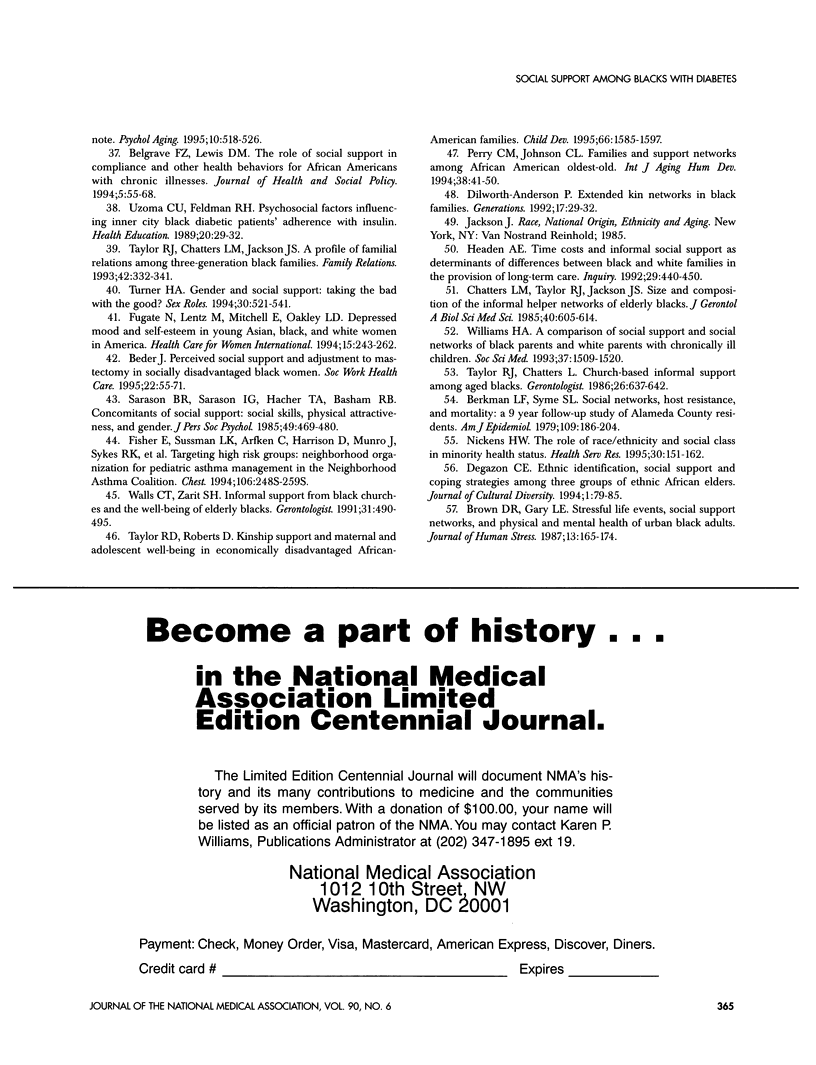
Selected References
These references are in PubMed. This may not be the complete list of references from this article.
- Beder J. Perceived social support and adjustment to mastectomy in socioeconomically disadvantaged black women. Soc Work Health Care. 1995;22(2):55–71. doi: 10.1300/j010v22n02_04. [DOI] [PubMed] [Google Scholar]
- Belgrave F. Z., Lewis D. M. The role of social support in compliance and other health behaviors for African Americans with chronic illnesses. J Health Soc Policy. 1994;5(3-4):55–68. doi: 10.1300/J045v05n03_05. [DOI] [PubMed] [Google Scholar]
- Berkman L. F., Syme S. L. Social networks, host resistance, and mortality: a nine-year follow-up study of Alameda County residents. Am J Epidemiol. 1979 Feb;109(2):186–204. doi: 10.1093/oxfordjournals.aje.a112674. [DOI] [PubMed] [Google Scholar]
- Brown D. R., Gary L. E. Stressful life events, social support networks, and the physical and mental health of urban black adults. J Human Stress. 1987 Winter;13(4):165–174. doi: 10.1080/0097840X.1987.9936810. [DOI] [PubMed] [Google Scholar]
- Chatters L. M., Taylor R. J., Jackson J. S. Size and composition of the informal helper networks of elderly blacks. J Gerontol. 1985 Sep;40(5):605–614. doi: 10.1093/geronj/40.5.605. [DOI] [PubMed] [Google Scholar]
- Degazon C. E. Ethnic identification, social support and coping strategies among three groups of ethnic African elders. J Cult Divers. 1994 Fall;1(4):79–85. [PubMed] [Google Scholar]
- DesRosier M. B., Catanzaro M., Piller J. Living with chronic illness: social support and the well spouse perspective. Rehabil Nurs. 1992 Mar-Apr;17(2):87–91. doi: 10.1002/j.2048-7940.1992.tb01519.x. [DOI] [PubMed] [Google Scholar]
- Eng E., Hatch J., Callan A. Institutionalizing social support through the church and into the community. Health Educ Q. 1985 Spring;12(1):81–92. doi: 10.1177/109019818501200107. [DOI] [PubMed] [Google Scholar]
- Fisher E. B., Jr, Sussman L. K., Arfken C., Harrison D., Munro J., Sykes R. K., Sylvia S., Strunk R. C. Targeting high risk groups. Neighborhood organization for pediatric asthma management in the Neighborhood Asthma Coalition. Chest. 1994 Oct;106(4 Suppl):248S–259S. doi: 10.1378/chest.106.4_supplement.248s. [DOI] [PubMed] [Google Scholar]
- Flaherty J. A., Gaviria F. M., Pathak D. S. The measurement of social support: the Social Support Network Inventory. Compr Psychiatry. 1983 Nov-Dec;24(6):521–529. doi: 10.1016/0010-440x(83)90019-6. [DOI] [PubMed] [Google Scholar]
- Gulick E. E. Social support among persons with multiple sclerosis. Res Nurs Health. 1994 Jun;17(3):195–206. doi: 10.1002/nur.4770170307. [DOI] [PubMed] [Google Scholar]
- Headen A. E., Jr Time costs and informal social support as determinants of differences between black and white families in the provision of long-term care. Inquiry. 1992 Winter;29(4):440–450. [PubMed] [Google Scholar]
- Kang S. H., Bloom J. R., Romano P. S. Cancer screening among African-American women: their use of tests and social support. Am J Public Health. 1994 Jan;84(1):101–103. doi: 10.2105/ajph.84.1.101. [DOI] [PMC free article] [PubMed] [Google Scholar]
- Krause N. Assessing stress-buffering effects: a cautionary note. Psychol Aging. 1995 Dec;10(4):518–526. doi: 10.1037//0882-7974.10.4.518. [DOI] [PubMed] [Google Scholar]
- Lacey L. P., Manfredi C., Balch G., Warnecke R. B., Allen K., Edwards C. Social support in smoking cessation among black women in Chicago public housing. Public Health Rep. 1993 May-Jun;108(3):387–394. [PMC free article] [PubMed] [Google Scholar]
- Lipton R. B., Liao Y., Cao G., Cooper R. S., McGee D. Determinants of incident non-insulin-dependent diabetes mellitus among blacks and whites in a national sample. The NHANES I Epidemiologic Follow-up Study. Am J Epidemiol. 1993 Nov 15;138(10):826–839. doi: 10.1093/oxfordjournals.aje.a116786. [DOI] [PubMed] [Google Scholar]
- Long D. D., Miller B. J. Suicidal tendency and multiple sclerosis. Health Soc Work. 1991 May;16(2):104–109. doi: 10.1093/hsw/16.2.104. [DOI] [PubMed] [Google Scholar]
- Maxwell A. E., Hunt I. F., Bush M. A. Effects of a social support group, as an adjunct to diabetes training, on metabolic control and psychosocial outcomes. Diabetes Educ. 1992 Jul-Aug;18(4):303–309. doi: 10.1177/014572179201800408. [DOI] [PubMed] [Google Scholar]
- McIvor G. P., Riklan M., Reznikoff M. Depression in multiple sclerosis as a function of length and severity of illness, age, remissions, and perceived social support. J Clin Psychol. 1984 Jul;40(4):1028–1033. doi: 10.1002/1097-4679(198407)40:4<1028::aid-jclp2270400427>3.0.co;2-1. [DOI] [PubMed] [Google Scholar]
- Murray R. P., Johnston J. J., Dolce J. J., Lee W. W., O'Hara P. Social support for smoking cessation and abstinence: the Lung Health Study. Lung Health Study Research Group. Addict Behav. 1995 Mar-Apr;20(2):159–170. doi: 10.1016/s0306-4603(99)80001-x. [DOI] [PubMed] [Google Scholar]
- Nelson M. A. Race, gender, and the effect of social supports on the use of health services by elderly individuals. Int J Aging Hum Dev. 1993;37(3):227–246. doi: 10.2190/TH88-1W6U-B0AT-377U. [DOI] [PubMed] [Google Scholar]
- Nickens H. W. The role of race/ethnicity and social class in minority health status. Health Serv Res. 1995 Apr;30(1 Pt 2):151–162. [PMC free article] [PubMed] [Google Scholar]
- Penning M. J. Health, social support, and the utilization of health services among older adults. J Gerontol B Psychol Sci Soc Sci. 1995 Sep;50(5):S330–S339. doi: 10.1093/geronb/50b.5.s330. [DOI] [PubMed] [Google Scholar]
- Perry C. M., Johnson C. L. Families and support networks among African American oldest-old. Int J Aging Hum Dev. 1994;38(1):41–50. doi: 10.2190/UQKB-EL57-TN8R-3W1A. [DOI] [PubMed] [Google Scholar]
- Schwartz L. S., Coulson L. R., Toovy D., Lyons J. S., Flaherty J. A. A biopsychosocial treatment approach to the management of diabetes mellitus. Gen Hosp Psychiatry. 1991 Jan;13(1):19–26. doi: 10.1016/0163-8343(91)90005-h. [DOI] [PubMed] [Google Scholar]
- Snapp M. B. Occupational stress, social support, and depression among black and white professional-managerial women. Women Health. 1992;18(1):41–79. doi: 10.1300/J013v18n01_03. [DOI] [PubMed] [Google Scholar]
- Taylor R. D., Roberts D. Kinship support and maternal and adolescent well-being in economically disadvantaged African-American families. Child Dev. 1995 Dec;66(6):1585–1597. [PubMed] [Google Scholar]
- Taylor R. J., Chatters L. M. Church-based informal support among elderly blacks. Gerontologist. 1986 Dec;26(6):637–642. doi: 10.1093/geront/26.6.637. [DOI] [PubMed] [Google Scholar]
- Taylor R. J., Chatters L. M. Church-based informal support among elderly blacks. Gerontologist. 1986 Dec;26(6):637–642. doi: 10.1093/geront/26.6.637. [DOI] [PubMed] [Google Scholar]
- Thomas S. B., Quinn S. C., Billingsley A., Caldwell C. The characteristics of northern black churches with community health outreach programs. Am J Public Health. 1994 Apr;84(4):575–579. doi: 10.2105/ajph.84.4.575. [DOI] [PMC free article] [PubMed] [Google Scholar]
- Turner W. L., Alston R. J. The role of the family in psychosocial adaptation to physical disabilities for African Americans. J Natl Med Assoc. 1994 Dec;86(12):915–921. [PMC free article] [PubMed] [Google Scholar]
- Uzoma C. U., Feldman R. H. Psychosocial factors influencing inner city black diabetic patients' adherence with insulin. Health Educ. 1989 Dec;20(5):29–32. [PubMed] [Google Scholar]
- Walls C. T., Zarit S. H. Informal support from black churches and the well-being of elderly blacks. Gerontologist. 1991 Aug;31(4):490–495. doi: 10.1093/geront/31.4.490. [DOI] [PubMed] [Google Scholar]
- White N. E., Richter J. M., Fry C. Coping, social support, and adaptation to chronic illness. West J Nurs Res. 1992 Apr;14(2):211–224. doi: 10.1177/019394599201400208. [DOI] [PubMed] [Google Scholar]
- Williams H. A. A comparison of social support and social networks of black parents and white parents with chronically ill children. Soc Sci Med. 1993 Dec;37(12):1509–1520. doi: 10.1016/0277-9536(93)90185-7. [DOI] [PubMed] [Google Scholar]
- Woods N. F., Lentz M., Mitchell E., Oakley L. D. Depressed mood and self-esteem in young Asian, black, and white women in America. Health Care Women Int. 1994 May-Jun;15(3):243–262. doi: 10.1080/07399339409516116. [DOI] [PubMed] [Google Scholar]


